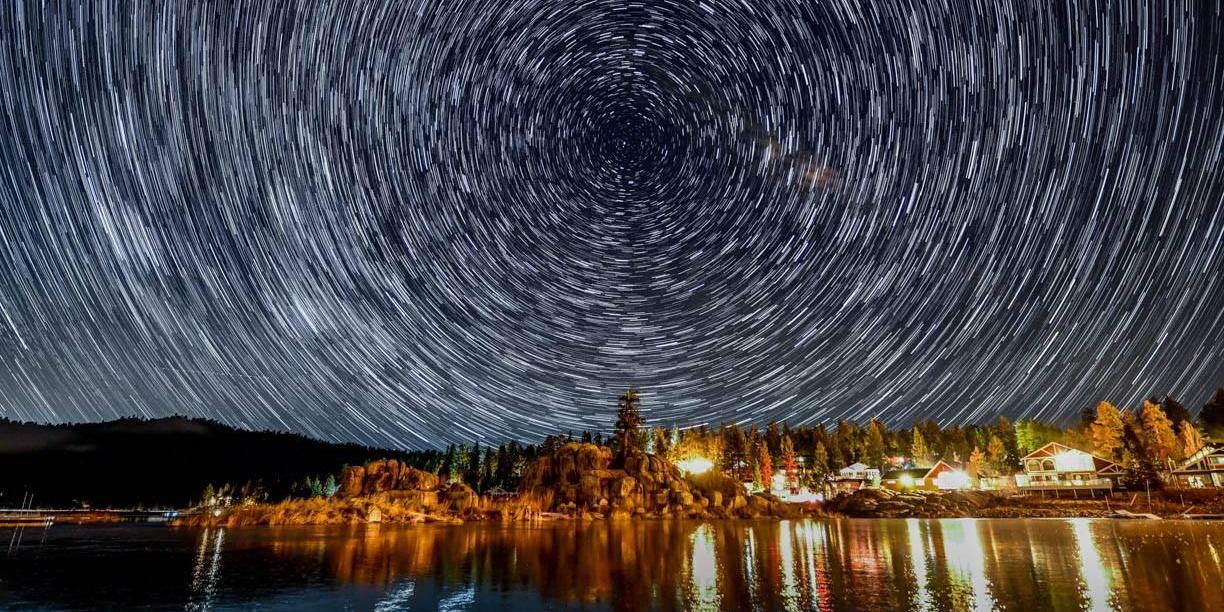Big Bear Stargazing
Take in the Night Sky Above Us!
Big Bear Lake sits in an ideal location for stargazing and night sky photography. Away from the bright, big city lights and at its high altitude, the night skies over the Big Bear valley stay dark enough to view constellations, meteor showers, and even the Milky Way!
However, the beautiful night sky is what we make it. Help us conserve our dark skies by turning off unneeded lights and limiting landscape lighting when the sun goes down. Not only will you make the night sky better, you'll be conserving energy as well!
The sky is the ultimate art gallery just above us. Ralph Waldo Emerson
Celestial Events & Fun
SkyFest Big Bear
SkyFest Big Bear takes you into space August 22 & 23, 2025!
With a host of events focused on bringing the stars, the wilderness and the effects of light pollution to the forefront, SkyFest invites everyone to explore the beautiful night sky above us.
Learn more and see a complete schedule HERE.
Astro-Photography Workshop - NEW!
Care For Big Bear hosts Photography Workshops lead by local photographer Brady Enger of Bending Energy Photography. Participants must be 18+ and need to bring:
- a DSLR or similar camera of their own
- a tripod camera stand
Date & Time:
- Friday, June 27 from 7 PM - 9 PM
- Saturday, June 28, 9 PM - 11 PM
Meeting Location: Stanfield Marsh Wildlife Preserve, 42300 Big Bear Blvd. Please arrive 20 mins early.
2025 New Moons - Best Stargazing Times!
When the Moon is located on the same side of the Earth as the Sun, it will not be visible in the night sky. This is known as New Moon and is the best time of the month to observe celestial objects like galaxies and star clusters because there is no moonlight to interfere. Sourced from SeaSky.org
January 29
February 28
March 29
April 27
May 27
June 25
July 24
Stargazing Must-Sees
Mark these fascinating astronomical events on your calendars and enjoy some time outdoors under the beautiful Big Bear night sky! Sourced from SeaSky.org
July 28 & 29 - Delta Aquarids Meteor Shower
The Delta Aquarids shower runs annually from July 12 to August 23. It peaks this year on the night of July 28 and morning of July 29. The crescent moon will set early in the evening, leaving dark skies for what should be an excellent show. Best viewing will be from a dark location after midnight.
August 12 & 13 - Perseids Meteor Shower
The Perseids is one of the best meteor showers to observe, producing up to 60 meteors per hour at its peak. It peaks this year on the night of August 12 and the morning of August 13.
Sidewalk Astronomy
Sidewalk Astronomy
On select dates, the Big Bear Valley Astronomical Society sets up telescopes on the sidewalk in front of Barrel 33 in The Village for a FREE public stargaze meet and greet. Located at 40754 Village Dr.
Disclaimer: Events are weather permitting. Check here for cancellations.
2025 Dates:
- July 5 from 8 PM - 10 PM - In the Village
- August 2 from 8 PM - 10 PM - In the Village
Star Parties - Everyone's Invited!
Big Bear Valley Astronomical Society will be setting up telescopes at one of their favorite dark sky sites - The High Chaparal. The public is welcome to join and mingle under the stars and look through the telescopes, or bring your own! Binoculars also work well.
Address: 76C5+F3V Baldwin Lake. This venue is a dirt cul-de-sac and not designed for large groups, we ask all attendees to be respectful and quiet in this area. Map this location
Disclosure: This event is weather permitting.
2025 Dates:
- June 21 from 8:30 PM - 11 PM
- July 26 from 8:30 PM - 11 PM
- August 23 from 8:30 PM - 11 PM
Perseid Star Party - Aug 9
Happening: August 9, 8:30 PM – 11 PM at Ski Beach Park located at 41216 Park Ave.
The Perseid Star Party hosted by Big Bear Astronomical Society celebrates the annual Perseid Meteor Shower with multiple telescopes for viewing planets, stars, and celestial phenomena. The public is invited and it's FREE to attend and enjoy - bring your family and friends, jackets, blankets and a chairs.
Big Bear Solar Observatory Tours
Tour the Big Bear Solar Observatory! Reservations are required, please call 909-866-5791 x210 or email norro@njit.edu or use the link below. Tours are FREE but donations are welcome.
Astronomical Society Monthly Meetings
The Big Bear Valley Astronomical Society meets on the 2nd Thursday of the month at 6 PM via Zoom. The public is welcome to join us, chime in or just listen.
Find Zoom link for the next upcoming meeting >>> HERE
Big Bear Stargazing 101
- Find a location away from bright lights with a wide view of the sky.
- It will take your eyes about 10-15 minutes to adapt to the dark. Use a red flashlight to keep your dark adaption intact.
- If you are new to stargazing, use a pair of binoculars. Many celestial objects are visible with binoculars, including the moon and planets.
- Download a stargazing app to help you navigate the sky above.
Start your star search with The Sky Live.
